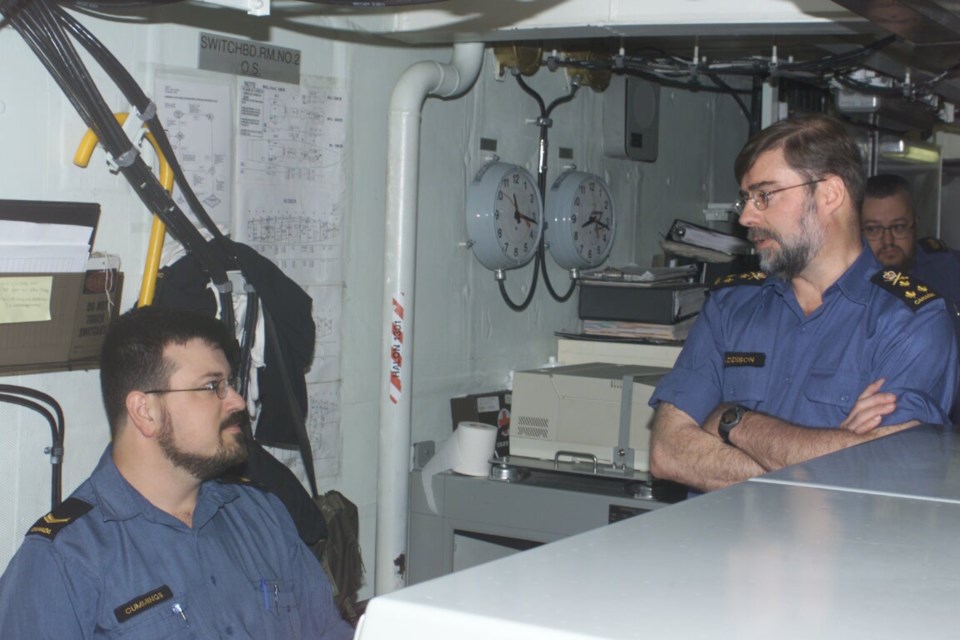OLDS — Navy veteran and Olds town councillor James Cummings is impressed with the Royal Canadian Legion Branch #105 in and the way town residents support and attend Remembrance Day ceremonies.
Cummings, 52, was born in Brampton, Ontario He joined the Royal Canadian Navy as an electrician in 1996 after serving in the naval reserves for about a year.
After he retired from the navy, Cummings and his wife Abbie moved to Olds because they were impressed with, among other things, O-NET, the Royal Canadian Legion Branch #105 and Community Learning Campus, a joint entity for École Olds High School and Olds College of Agriculture & Technology.
They’ve been attending Remembrance Day ceremonies in Olds since he moved to Olds in December of 2015.
During an interview, Cummings said he and Abbie were a little surprised to find that the Remembrance Day ceremony in Olds is held indoors at the CLC gym, but they’ve gotten used to that.
They also attend the outdoor ceremony held at the cenotaph in Centennial Park.
The first time they went to the CLC ceremony, Cummings was pleased that it was “standing room only.”
"The turnout in Olds is fantastic. When you have a facility that’s pretty much the largest facility we have in Olds and it’s standing room only, you have to be happy with that type of turnout,” he said.
“And it’s a good crowd of veterans here in Olds. The Legion has had some problems over the years keeping membership and keeping our facilities open, but our Legion here is doing fantastic in that.
“So I’m very happy with our turnout to our Remembrance Day ceremonies from all age groups.”
Cummings spent 25 years in the navy. He was posted to Halifax and later Victoria.
He was sent on seven deployments overseas of various types.
Cummings was part of a UN mission off the coast of Iraq, hunting oil smugglers.
He also undertook three missions in the Persian Gulf during the war on terrorism, supporting battles, catching weapons and drug smugglers
His last major mission was going after pirates off the coast of Africa.
Although he was an electrician, Cummings saw his share of action.
"In the navy, your whole ship is in combat, right? So when you go into a theatre, a conflict zone, it doesn’t matter what you are, you’re a sailor first,” Cummings said.
“So whether you’re an electrician or a plumber or a weapons technician, you’re all part of the same navy, you’re doing the same navy stuff.”
He served as a firefighter and was a member of boarding parties when the navy boarded other ships, “kind of a little SWAT team sort of thing.”
Cummings was asked if he was ever involved in any scary incidents.
“Not scary,” he said. “I mean, the difference between us and these folks is we’re professionals. We’re highly trained, we know what we’re doing and we’re well equipped.
“You come across a bunch of drug smugglers who as soon as they see us and our big grey warship, they hop into a fast boat and they take off and they leave their transport ship or smuggling ship there.
“Oil smugglers are just normal folks trying to get a dollar here or there. They’re not really evil or bad people so they just surrender and we take their ship full of oil.
“Pirates are a little different. They tend to shoot back, but never really aiming very well. So piracy is not really anything very scary.”
Cummings said the amount of drugs his ship would confiscate was often pretty substantial. That could include pallets “up to here” he said, raising his hand to his chest.
“I think the biggest one we’ve ever gotten would have been close to about $600 million or $700 million in heroin in the Persian Gulf,” he said.
“We take some photographs, then it all goes in the ocean. Then we tend to blow up the ship that smuggled it -- target practice.”
Cummings said he never suffered post-traumatic stress disorder (PTSD), a condition that affects many in the military.
“I find it odd, today’s definition of PTSD when people talk about, oh, they saw a horrible car accident and they have PTSD,” Cummings said.
“I’ve pulled bodies out of the ocean in pieces and it’s a different world when you’re in the military.
“But we have a lot of training to deal with those situations when they arise and to mitigate the damage – I'll say that – it causes emotionally.”
Cummings is heartened by the support of -- and participation in -- Remembrance Day ceremonies among Canadians.
He believes Canada’s participation in the Afghanistan war from 2001 to 2014 is a big reason for that, because it’s still relatively fresh in Canadians’ memories.
"Our media attention became very positive during the war in Afghanistan,” Cummings said.
“That was a very long conflict, it was in the news quite a bit. The whole Highway of Heroes media coverage in Ontario was very powerful.”
He said a program by the Royal Canadian Legion in which during Remembrance Day week veterans share their experiences with school children has also been a major factor.



